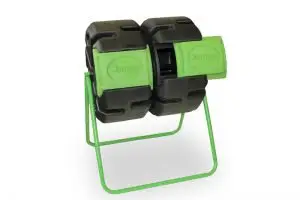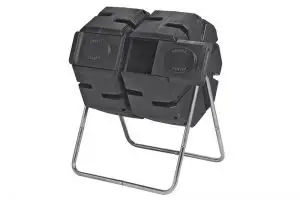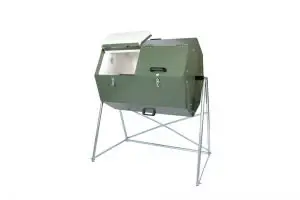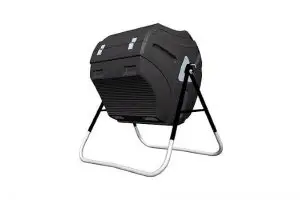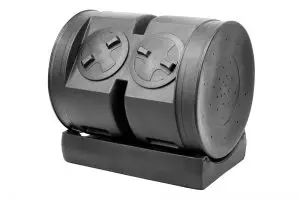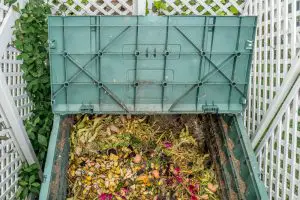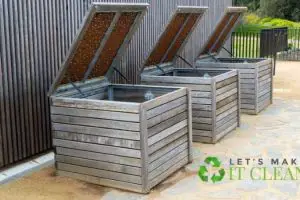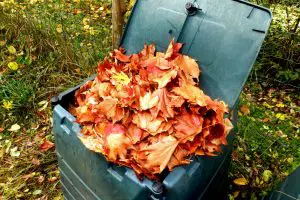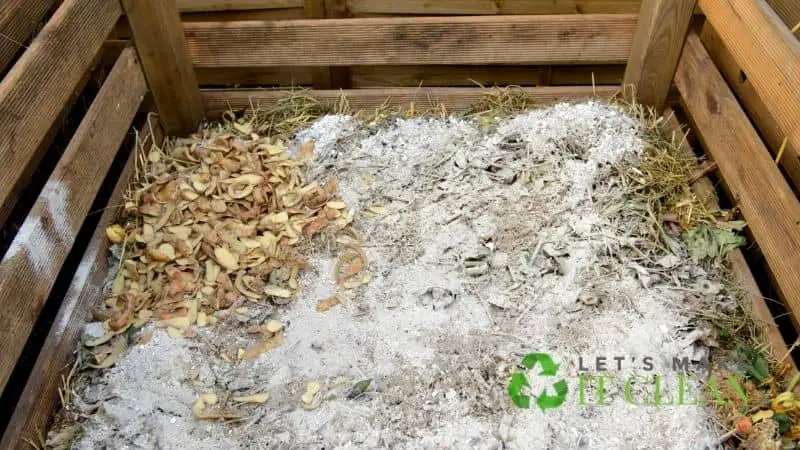Let’s agree that compost tumbler odor is a result of your own creation; read keenly. It may not bother you as much, especially when it’s on the outside of your house.
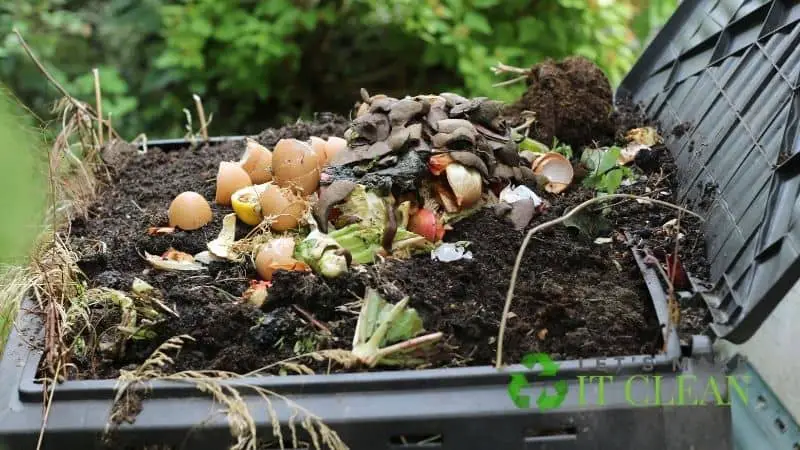
Honestly, I wouldn’t want mine to stink. But does yours stink?
Quick Navigation
Composting is an environmentally friendly way to turn your kitchen waste into nutrient-rich fertilizers. However, you need to add garden waste to make the compost more beneficial to your lawn or potted plants.
If you’re having any issues with your compost tumbler, especially a smelly pile, then you need to apply some of the techniques we’ve discussed in this article.
Good Reasons to Compost
- Eliminates the necessity of using synthetic fertilizers hence cost-saving
- Improves soil quality
- Reduces the amount of garbage you produce hence saving on the cost of a garbage pick up
What You Should Not Compost
- In-organic materials like metal, glass, and plastic
- Meat scraps and bones
- Poop from your pets
- Large wood pieces
- Dairy products
- Foods cooked in oils/butter
What You May Not Know That Might Also Be Added Into the Compost
- Egg carton
- Eggshells (eggshells in compost)
- Teabags
- Paper products: newsprints, paper bags, coffee filters, paper towel, cardboard, and printed papers (Read: what to put in your compost tumbler)
Remember all these need to be shredded before disposing into the pile.
Reasons Behind a Smelly Compost and Possible Fix
A smelly compost is not hard to fix. But it is imperative to study the cause of this occurrence in the first place. A healthy compost bin should smell a lot more earthy than dirt.
If you do not have anything close to this, then there is a chance your compost is not getting enough oxygen or too much nitrogen getting in your way.
We have, however, discussed more reasons contributing to a stinky compost tumbler. Keep reading…
So Much Green Material
It is important to understand the idea of composting is balancing the greens and browns. The ratio doesn’t have to go out of kilter; otherwise, you’ll be growing a stinky one.
Green materials are nitrogen-rich. These include a lot of kitchen scraps, grass clippings, vegetable and coffee grounds.
If you want to restore peace in your compost, then you need to add more brown materials and mix them into the pile. Brown materials contain mostly carbon – for instance, wood chips, newspaper, and straw. So, you should be adding some brown material every other time you add green material.
The Compost Might Be Too Wet
For organic matter to decompose properly, it needs moisture. But if the moisture is so much, the compost can be lumpy and devoid of oxygen. When this happens, the pile can start to rot and become stinky.
No one is immune to the smell of a stinky compost tumbler. But this one is a simple fix. Add more browns, especially shredded newspapers, to suck up excess moisture. Turning the pile is also an option because it will help the compost dry and enhance the aeration.
A compost tumbler might as well get wet if too much green material is added to the pile. Also, it could be exposed to too much rain, especially during spring and winter.
If rains are the main cause of your compost becoming too wet, then consider covering it up. Some might think of moving it to a different location in the yard where rains are not on its sight. If it gets more sun, it will definitely not become too wet.
Addition of Meat, Dairy, and Fats
Animal products are one of the most difficult waste to manage. They tend to produce a putrid odor and hence attract rats, raccoons, and dogs.
So, the most convenient way to arrange animal products is in the middle. First of all, they break down quite fast and provide insulation that prevents any bad smell from escaping the compost.
Too Compacted Compost
A fact about green chippings is their tendency to compact easily, creating impenetrable layers. These layers hinder oxygen circulation making your compost oxygen-deficient.
This environment will encourage anaerobic decomposition; however, slow it goes. If you want to turn the pile, the compact material will ‘fluff up’ your compost and break the compacted material.
Add some wood chips or shredded leaves to prevent the compost from compacting again.
If Not Correctly Layered
By layering your compost correctly, we mean the combination of greens and browns must be well structured. Otherwise, your compost pile will end up becoming stinky.
Give it a good turn if you have integrated the brown materials correctly. Also, do not leave the green material exposed. It is recommended to add brown materials at the top of the compost too.
FAQs
What Is the Ratio Required for Mixing Greens and Browns?
An ideal ratio for browns against greens is 3:1. This means; for every three parts of brown materials, there is one part of green materials. If you maintain this ratio, then your pile will not have any excess moisture. It also influences the optimal performance of aerobic microbes responsible for soil improvement.
When adding the browns, dehydrated leaves, and kitchen scraps, make sure you shred them into tiny pieces to facilitate decomposition. It also plays a significant role in minimizing moisture content in the mixture that will otherwise form a matted mess.
Turn the tumbler regularly, at least once per week. When the climate is too cold, you will need to turn your tumbler more often. This process of turning your tumbler improves air circulation and prevents your compost pile from smelling.
How Do I Keep My Compost Bin in the Kitchen and Not Smell?
Well, the kitchen is the most convenient place to store your waste temporarily before disposing of it in the tumbler. But if you stick to the steps we have outlined below, you’ll be thankful.
Get a compost bin with a charcoal filter. Note that these filters need replacement at least every few months to avoid wearing out.
Charcoal filters are renowned for containing any smell from escaping into the kitchen. Ensure the top lid is stainless steel and offers airtight closure that ensures no pest interaction with your compost bin.
If you have no intention to buy any specialized compost bin, make sure you empty your kitchen waste at least every two to three weeks.
Although there is no special way to prevent the bin’s food from decaying, adding some brown material will soak up the moisture, and your bin will go a long way without smelling.
After How Long Should My Compost Be Ready?
Mostly it should take about two months for organic waste to turn into compost. Thereafter, you should not add anything to it.
Mix it weekly to ensure it remains moist. If you begin to smell something earthy and its color conforms to rich, clumpy soil, then it is a good sign that the compost is ready for use.
It is mostly advised to keep at least two bins so that you’ll have another bin for your fresh ingredients when one is maturing.
How Do I Get Rid of Rats and Vermin From My Compost?
It is easy to keep these animals from accessing the top of your compost tumbler with a firm lid. To keep them away from entering your compost through burrowing underneath, use a tumbleweed compost aerator or mate and mix all the way to the base and lift it back.
This way, you’ll have minimized the risk of rats and vermin from accessing your compost tumbler.
Final Thought
Now you’ve realized it’s easy to reduce the amount of garbage by turning waste into fine soil for your garden. Even more, you can do it the right way, and your compost won’t smell.
Would you tell your neighbor if their compost stinks? Would you enlighten them about what they’re doing wrong and correct them? It’s good to share.

